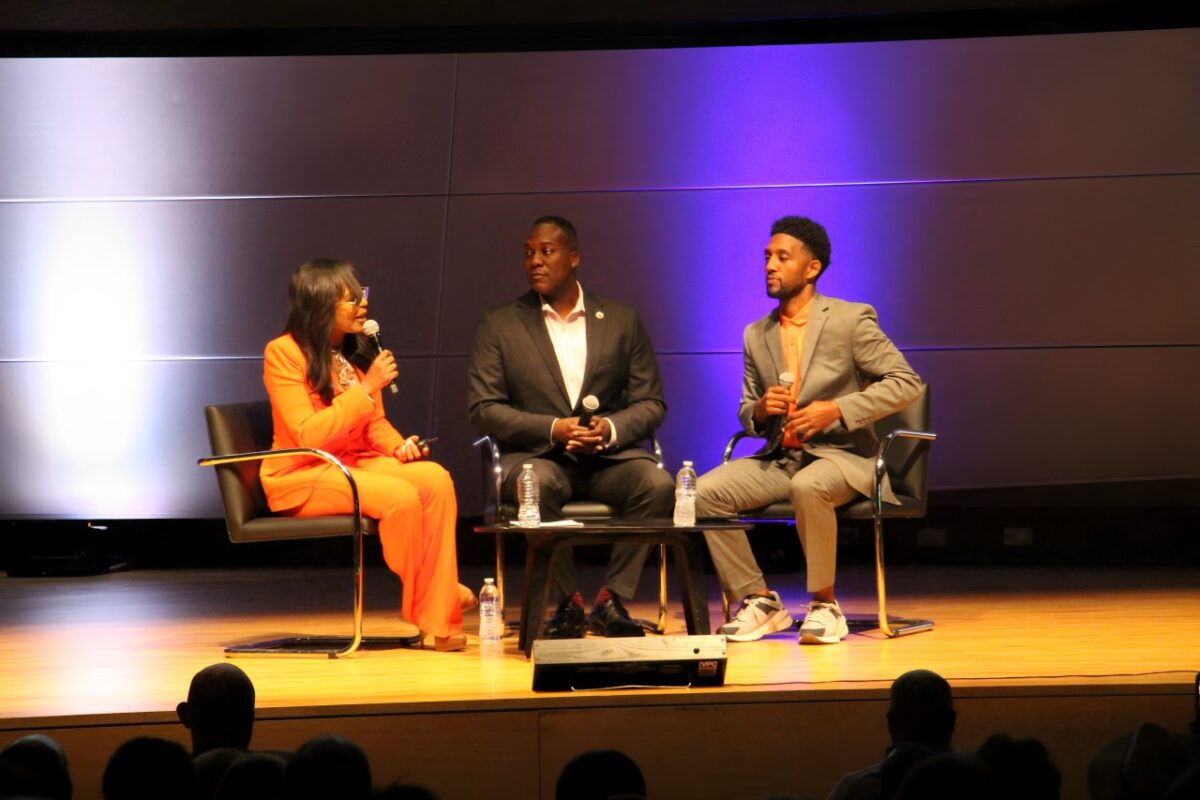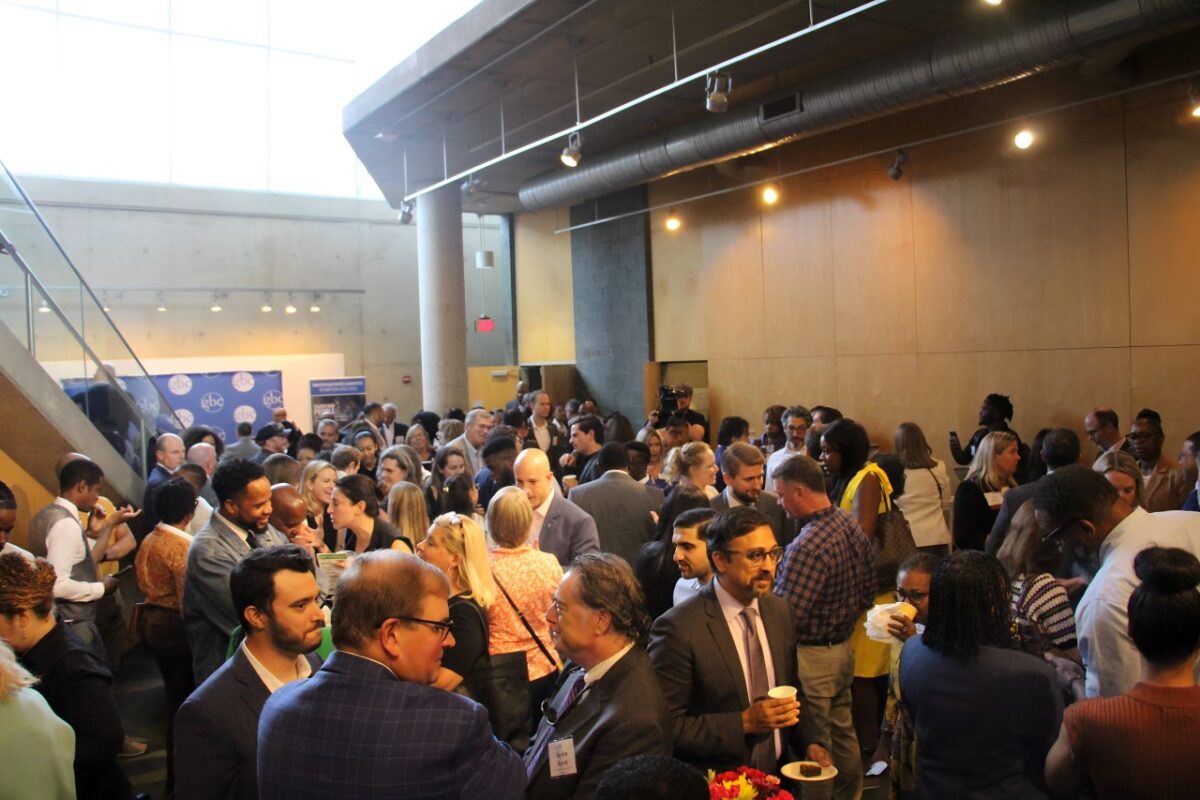The organizing process, they said, was beneficial, enabling cross-sector collaboration and frameworks to boost the region’s innovation potential — even without that official EDA support.
Ken Malone of Early Charm Ventures put it this way: “Competing gave us a regional tech-based economic development plan which put equitable development at its core. It’s the right plan, we’ll just find other ways to fund it.”
The Greater Baltimore Committee (GBC), a regional economic development booster and one of the $70 million EDA bid’s main organizers, leaned into this message during the Baltimore Region Investment Summit. The event, which took place at the Maryland Institute College of Art’s (MICA) Brown Center on June 27 — five days before the EDA announced its Phase 2 decision — showcased the city’s commitment to becoming a premier tech hub, with a strong focus on inclusive growth.
As a Baltimore-based entrepreneur, I found the balance between government leadership, private companies and entrepreneurial ecosystem builders offered a promising harmony that bodes well for that future.
One thing that’s for certain, in my opinion, is that we need stakeholders and leadership from every sector if we’re going to successfully shepherd Baltimore and the surrounding metropolitan area to its full potential.
At the summit, several panels and discussions featuring some of the city’s highest-profile government and industry leaders backed up that assessment. Here’s what went down.
‘Equity is the law of the land’
A panel moderated by Downtown Partnership of Baltimore President Shelonda Stokes directly addressed Baltimore’s potential to become a leading tech hub through equity and collaboration. For instance, Mayor Brandon Scott emphasized the importance of ensuring Baltimore’s growth includes all its residents.
“Equity is the law of the land,” Scott said.
His commitment to addressing violent crime and creating public-private partnerships, such as the renovation of CFG Bank Arena, illustrated a holistic approach to community development.
Howard County Executive Calvin Ball echoed this sentiment, noting the collaborative efforts across counties to foster business development and innovation. While he discussed the county’s microloans and other programs to support startups and small businesses, he also noted how much the state’s biggest city matters to the region’s economic vitality.
“A successful Baltimore,” said Ball, “is a successful Maryland.”

Another session focused on the importance of supporting the city’s founders, creatives and entrepreneurs. UpSurge Baltimore CEO Kory Bailey cited the “untapped potential” value of “building a founder-led ecosystem” while stressing the need for a supportive infrastructure to help all ideas, regardless of origin, find market success.
The Novella Center for Entrepreneurship and Conscious Venture Partners’ leader Jeff Cherry spoke about his own commitment to supporting underrepresented founders, as demonstrated in the Conscious Venture Lab accelerator’s focus, and breaking down barriers to access. He further discussed the need to invest in equitable ideas and be open to investing in anyone.
“I’m a New Yorker who has chosen to be here in Baltimore,” Cherry said, highlighting the city’s growing appeal to innovators.
Universities and investors highlight funding and other supports
Heads of some of the region’s main innovation support entities, from public and private universities to a new investment fund, broke down their respective employers’ ongoing local impact.
Christy Wyskiel, the senior advisor to the president of Johns Hopkins University for innovation and entrepreneurship, discussed the institution’s role in driving Baltimore’s tech ecosystem. With over $4 billion in annual research investment and significant projects like the Science and Technology Park in Eager Park, Johns Hopkins is pivotal in transforming research into practical applications, she said.
TEDCO CEO Troy LeMaile-Stovall emphasized intentional investment in diverse entrepreneurs, with 60% of the state-founded early-stage funder’s 2023 investments going to underrepresented founders.
Matt Tremblay also discussed Blackbird Laboratories, which he founded to encourage biotech startup growth in Baltimore. Launched last year with a $100 million founding gift from the Bisciotti Foundation, the initiative focuses on leveraging early-stage capital to develop novel therapeutics and AI-powered predictive medicine. As part of this mission, Blackbird plans to open a physical incubator in the city to support startups.

Mohan Suntha, president and CEO of the University of Maryland Medical System (UMMS), discussed the healthcare network’s commitment to improving community health through data-driven innovation. The Institute for Health Computing in North Bethesda exemplifies these efforts to create a learning healthcare system in partnership with other parts of the public university ecosystem. Through this and other efforts, like partnerships with Johns Hopkins and Columbia-based healthcare giant MedStar Health, UMMS is trying to tackle various healthcare challenges while creating an ongoing internal system of learning.
Other speakers connected Baltimore’s investment prospects with those of the area beyond the city and its surrounding counties. Kathy Hollinger, CEO of Greater Washington Partnership, highlighted her organization’s super regional approach and Baltimore’s critical role in regional competitiveness. This alliance of CEOs and C-suite executives is dedicated to championing inclusive economic growth across the region between Baltimore and Richmond, Virginia, by using tailored solutions for each community within a broader regional strategy.
Hollinger said that leaders throughout this alliance have contributed at least $41.5 billion to the regional economy every year. She also touched on the over $3.2 billion that alliance partners like Under Armour, Northrop Grumman, JPMorgan Chase and others donated toward the $4.7 billion Shared Prosperity program to support underrepresented entrepreneurs.

Overall, the Baltimore Region Investment Summit highlighted the city’s potential as a tech hub driven by inclusive growth. With strong leadership, significant investments and a collaborative spirit, Baltimore is poised to become a model for other cities aiming to balance innovation with community development.
Given my own entrepreneurial background, I left the summit feeling inspired by the city’s commitment to equity and collaboration. The collective efforts of local leaders and institutions can ensure that Baltimore’s rise benefits all its residents, making it a vibrant and equitable place to live, work and build a business.
The future of Baltimore’s tech ecosystem looks promising and I am excited to be a part of this journey.
This article mentions TEDCO, a Technical.ly client. That relationship has no impact on this report.
Correction: An earlier version of this article erroneously described Lockheed Martin as a contributor to the Shared Prosperity initiative. The correct contributor is Northrop Grumman. (7/9/2024, 12:05 p.m.)







